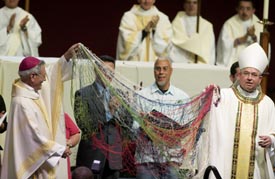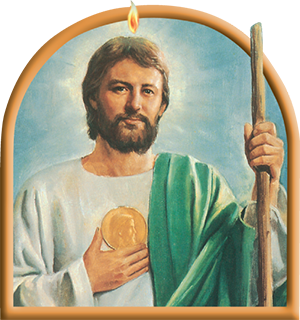Nourishing the spirit within you
How the highest-ranking U.S. Hispanic bishop answered the call
 I felt the Lord might be calling me when I was about 12 or 13. The brothers of the Marist school I attended in Monterrey, Mexico offered us regular vocational retreats, so I had plenty of opportunity to think about it.
I felt the Lord might be calling me when I was about 12 or 13. The brothers of the Marist school I attended in Monterrey, Mexico offered us regular vocational retreats, so I had plenty of opportunity to think about it.
When I finished high school, I thought of going to the seminary, but the first time I told my father, he was opposed to my becoming a priest. He said, “The only thing I can leave to you is your education, and I want you to finish college before you make the final decision.”
I accepted my father’s plea, but I thought, “If at some point I am going to follow my vocation to the priesthood, I need to take care of my spiritual life.” So I began going to daily Mass, trying to live my faith. I decided to be a better Catholic.
This helped strengthen my spiritual life so the calling from God did not get lost, because at times it was difficult for me. The road had some obstacles: the first of which was my father’s opposition. Although my mother’s reaction was different, she still was uncertain. She thought it would be a good thing for me, yet she was torn because of the conflict with my father.
Another obstacle was that I was never totally sure of what God wanted from me—if I really wanted to be a priest. I resisted a little what I later saw to be the will of God. So to make the decision to go to the seminary was a little frightening. It was a difficult decision.
I joined Opus Dei, where I received spiritual direction and formation, and I grew in my spiritual life. But I didn’t make a decision to become a priest until I was studying theology at the University of Navarra in Spain. When I finally made that decision, it was as if a big burden had been lifted and I could begin to fly spiritually, to grow.
I believe that most young people, at some point or another, face similar situations in life where they have to make a decision, whether it be to the priesthood or religious life or to marriage. They are searching for more, and I think in order to listen better to what God is asking of them, they need to start a personal relationship with him.
What makes us happy is to grow in our spiritual life, in our love for God and for others. Society is materialistic and it is difficult to leave your possessions overnight, but walking with God and fulfilling God’s will is a liberation.
For Hispanics, faith and culture go together. If our young people develop their spirituality, they will never lose their Hispanic identity. But they need to be educated in the faith. In order to love God we need to know him, through reading, studying, retreats, and so on.
But one of the most important things Hispanic youth must do in following their vocation—whether it be to religious or lay life—is to give importance to their education as leaders of society and the church. They are called to be evangelizers for the new millennium.
Your turn
- If you felt God was calling you, how would you prepare?
- What are the main obstacles society places in your way?
